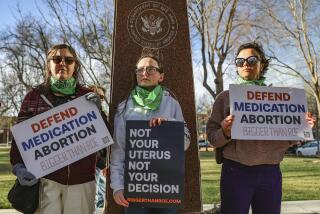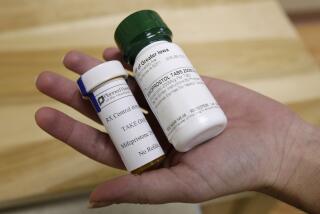Less-effective birth control pills
- Share via
New birth control pills that are less effective than the original contraceptives of the 1960s in preventing pregnancy could win federal approval if they promise other benefits, under a recommendation by health advisors.
Food and Drug Administration advisors refused last week to recommend a set standard on how often next-generation pills would have to fail for them to be denied federal approval.
“We don’t want an arbitrary number to be ascribed,” said Dr. Charles Lockwood of Yale University, acting chairman of FDA’s reproductive health drugs advisory committee.
Instead, the panel of outside experts recommended the agency keep an open mind to approving less-effective pills that could offer other important benefits, such as reduced risk of blood clots and stroke. Doing otherwise could limit women’s options, the panel said.
Most of the roughly 12 million U.S. women who take the pill do so to prevent pregnancy. But others rely on hormonal contraceptives to curb acne or regulate their monthly periods. The latest, low-dose versions of the pill allow women to go 84 days between periods.
Throughout the 1960s, the earliest birth control pills to win FDA approval failed just once per 100 woman-years of use. That is, for every 100 women taking the pills for a year, there was fewer than one pregnancy on average among them.
Today, newer pills contain less estrogen and progestin. Those pills can reduce the risk of sometimes deadly side effects. But as the hormone content of the pills has dipped, failure rates have climbed.






